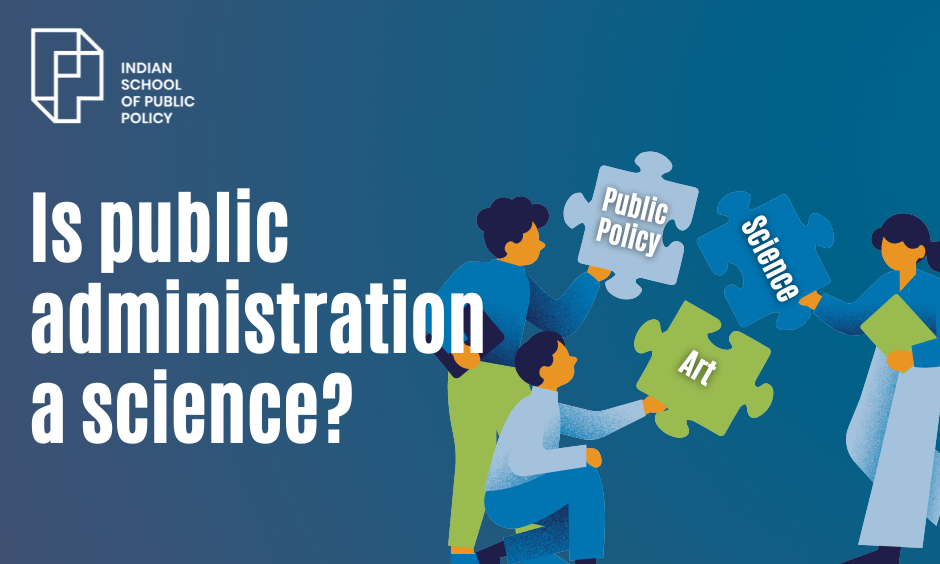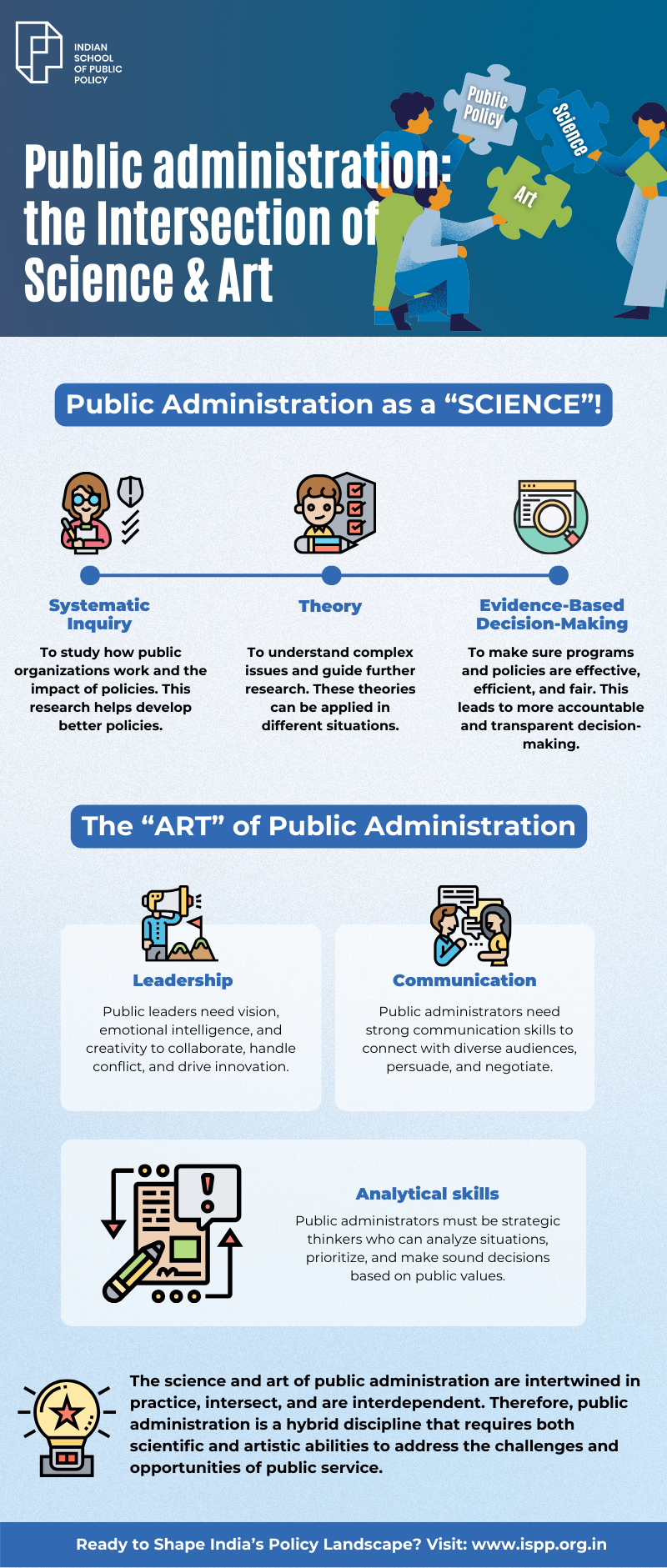
Is public administration a science?

What is public administration? | The diverse perspectives | What does the practice entail? | The “Science” lens | Exploring the “Art” element | The verdict? | FAQs | References
In India, Public administration is perceived and practised as a part of political science. However, public administration is an intriguing field that extends beyond the realms of science. It is a multidisciplinary subject that draws its features from fields such as political science, sociology, economics, law, psychology, and more
Public administration involves a scientific study and application of systematic systems and principles to manage governmental agencies, programmes, and policies effectively. However, the extension of its application requires practitioners to be adaptable while using creativity in their approach to address complex issues and manage public resources. Their judgments and decision-making should be able to withstand the dynamic environment while engaging with stakeholders. Thus, administrators should be well rounded to have an understanding of the scientific aspects of Public Administration and also possess the art of leadership, communication, and other soft skills. Effective governance can only be an amalgam of science and art, if one may call it.
It seems that there is a long-standing debate about whether public administration is a science, an art, or a combination of both.
The Debate
In modern times, the approach to public administration has been undergoing a radical change. The scope has become varied and dynamic. This dynamic nature of public administration demands continuous exploration and improvement.
Some scholars advocated that public administration was based on scientific principles and followed a defined methodology. They contend that theories and models defining public administration contribute to a deeper comprehension and subsequent enhancement of the field.
On the other end of the spectrum were those who espoused that Public Administration was dependent on human qualities such as intuition, values, and ethics. This required a creative approach and made the process dynamic. This would help the practitioner to be adaptable and balance conflicting interests and demands.
Practice of Public Administration in India
Public Administration in the Indian context refers to the practice of functional administration by the executive in a broad sense. In addition, it is a discipline that lends itself to intellectual enquiry. Most scholars restrict the understanding of Public Administration to be limited to the executive functions and refer to the organisation and management of public activities. Thus, the view limits public administration to the processes. However, this view has to be expanded in the modern context. India is a diverse country with complexities and dynamic situations. There can be no standardisation possible. This requires the practitioner to be agile and flexible in his thinking. Administrators and policymakers must be able to tackle a complex landscape shaped by political dynamics, social values, and other constraints. This would require them to exercise discretion and be intuitive in their decision-making. A broader approach to Public Administration would also require creativity.
The primary goal of Public Administration is to accomplish the objectives formulated by the state and policymakers. The extended vision is to break down silos and embrace diversity of thought. This requires a broader concept where the subject itself is open to improvements and enhancement of professional capability through creativity.
The idea is to overcome differences and recognise the interconnectedness of human creativity and inquiry. Collaboration can only be fostered by embracing diversity and nurturing creativity.
Let’s just take a moment and see
Public Administration as a “SCIENCE”!
Public administration is a discipline built on evidential processes. It is a science that relies on a commitment to systematic inquiry and empirical analysis. Some of these are –
➤ Systematic Inquiry – Public administration employs methodologies like quantitative and qualitative research methods to investigate the structures, processes, and outcomes of public organisations and policies. Through observation, data collection, and analysis, practitioners discover patterns, and relationships, and generate knowledge that becomes the edifice for policy development.
➤ Theory – Public administration is guided by frameworks that provide insights into behaviour, decision-making processes, and policy outcomes. These theories are the cornerstone of an understanding of complex issues and for the basis of further research. This in turn leads to building on knowledge and its applicability in different contexts.
➤ Evidence-Based Decision-Making – Administrators and policymakers rely on empirical research to assess the effectiveness, efficiency, and equity of government programmes and policies. This approach is key to ensuring accountability, transparency and responsiveness in a fair decision making process.
Now, let’s come to
The “ART” of Public Administration
While the underlying tenets of public administration rely on scientific inquiry to elucidate patterns and principles, there are dimensions of creativity, adaptability, and judgement. Some of these could be –
➤ Leadership – Leaders engaged in Public Administration must possess the vision, and emotional intelligence to enable them to collaborate, manage conflicts, and foster innovation. Leadership, thus, goes beyond implementing predetermined strategies to responding to challenges and opportunities through creative thinking and improvisation.
➤ Communication – The ability to convey information, build relationships, and influence stakeholders effectively through communication skills is key to successful Public Administration. Communication with diverse audiences like officials, citizens, interest groups, and colleagues can help in persuasion and negotiation.
➤ Analytical skills – Strategic decision-making in uncertain and ambiguous situations is key for administrators. They must prioritise, anticipate potential outcomes, and make choices that align with objectives and public values. This requires analytical skills that are built on an understanding of human behaviour, culture, and political dynamics.
The Intersection of Science & Art
The science and art of public administration are intertwined in practice, intersect, and are interdependent. Effective governance requires a blend of creativity, problem-solving, empirical approach, and adaptive strategies to be successful in a dynamic setup. In that sense, Public Administration should incorporate both dimensions – the application of scientific methods and leveraging artistic abilities to derive solutions.
Therefore, public administration is a hybrid discipline that requires both scientific and artistic abilities to address the challenges and opportunities of public service.
Register your Interest to Study at ISPP
FAQ
Is public administration considered a science in India?
Public administration in India is generally perceived and practised as part of political science. However, it is a multidisciplinary field that draws from various disciplines such as political science, sociology, economics, law, psychology, and more.
What is the ongoing debate about public administration being a science or an art?
There is a long-standing debate about whether public administration is a science, an art, or a combination of both. Some argue for its scientific principles and methodology, while others emphasise the human qualities of intuition, values, and ethics, making it dynamic and creative.
How is public administration practised in India, and what challenges does it face?
In India, public administration involves the practice of functional administration by the executive, but the view has expanded to include intellectual inquiry. The diverse and dynamic nature of the country requires administrators to be agile, flexible, and creative in their thinking to tackle complex situations.
Is public administration solely a science or does it involve artistic elements?
Public administration is both a science and an art. It relies on systematic inquiry, evidence-based decision-making, and theories (scientific aspects). Simultaneously, it requires artistic elements like leadership, communication, and analytical skills to address the dynamic and complex challenges faced in practice.
What is the primary goal of public administration, and how does it balance science and art?
The primary goal of public administration is to accomplish state and policymaker objectives. Balancing science and art, it incorporates systematic inquiry, theory, and evidence-based decision-making (science) while also embracing creativity, leadership, and effective communication (art) for successful governance.
Infographic:

Resource
- Biswas,A.(2020).Is public administration a science or art?SPS.https://schoolofpoliticalscience.com/is-public-administration-a-science-or-art/
- Fukuyama,F.(2004).Why there is no science of public administration.Journal of International Affairs,58(1),189-201.https://www.jstor.org/stable/243579
- Juneja,P.Public Administration: An art or science,https://www.managementstudyguide.com/public-administration-an-art-or-science.htm#google_vignette
- Paul V.Jipson (2010),Public Administration Theory and Practice, https://sde.uoc.ac.in/sites/default/files/sde_videos/PublicAdministrationTheory137.pdf
- Ralph F. Shangraw Jr. & Michael M. Crow (1998) Public administration as a design science, International Journal of Public Administration, 21:6-8, 1059-1077,https://www.tandfonline.com/doi/pdf/10.1080/01900699808525334#:~:text=As%20a%20design%20science%2C%20public,in%20individual%20and%20social%20settings.


